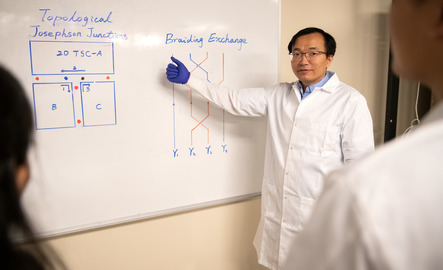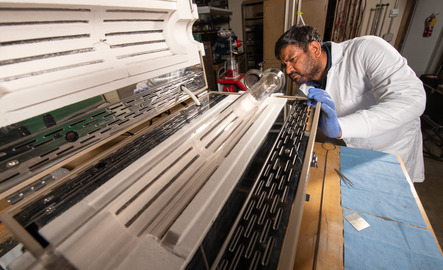About the M.S. in Quantum Engineering & Information Science
Our master’s in quantum engineering is a cutting-edge program that provides students
with innovative coursework, internship opportunities and on-campus involvement.
Students also have the opportunity to work alongside renowned faculty to complete
research on externally funded grants from national laboratories, national agencies
and private companies, including the NSF, DOE, DOD, Los Alamos, Microsoft, Google,
Atom Computing and many more.
The M.S. in quantum information science and engineering is made possible through a
collaborative, interdisciplinary partnership between the School of Computing, the Department of Physics and Astronomy and the Department of Electrical Engineering and Computer Science—all within the College of Engineering and Physical Sciences.

M.S. in quantum engineering students may choose from two concentration paths, including:
- Quantum Mechanics: Students study this fundamental physics theory to better understand how light and matter function on an atomic level.
- Quantum Computation: This concentration utilizes quantum mechanics and computer science to help students harness the power of quantum computers.

What can you do with a master’s in quantum engineering and information science?
A master’s in quantum engineering and information science prepares you for careers at the forefront of emerging technologies, including roles as a quantum software or hardware engineer, algorithm developer, cryptography specialist or R&D engineer. You'll gain advanced skills in quantum mechanics, computation and experimental techniques, making you a strong candidate for jobs in tech companies, national labs or startups—or for continuing on to a Ph.D. program. This degree positions you to contribute to the rapidly growing field of quantum technologies.
- Quantum software or hardware engineer
- Quantum algorithm developer
- Quantum systems researcher or lab technician
- Quantum cryptography or cybersecurity specialist
- Data scientist or machine learning engineer in quantum applications
- Technical consultant in quantum technologies
- R&D engineer at national labs, tech companies or startups
- Ph.D. student in quantum science or engineering
- And more!
- National Laboratories
- IBM
- Microsoft
- Atom Computing
- Honeywell
- And more!
To become a quantum engineer, you typically start by earning a bachelor’s degree in
physics, electrical engineering, computer science or a related field. From there,
many pursue a specialized master’s or Ph.D. in quantum information science and engineering
to gain deeper knowledge of quantum mechanics, computing and experimental techniques.
Building strong skills in programming, math and lab work is essential, along with
experience in areas like quantum optics, cryogenics or nanotechnology. Internships,
research projects and working with quantum-focused labs or companies can also help
you break into this cutting-edge field.
Quantum engineers are hired across a wide range of industries, including:
- Technology and computing
- Cybersecurity
- Finance
- Healthcare and pharmaceuticals
- Aerospace and defense
- Telecommunications
- National laboratories and government agencies
- Academia and research institutions


